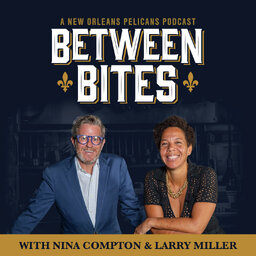Brett Anderson & Brett Martin | Between Bites Podcast with Nina Compton & Larry Miller S3E7
On episode seven of the third season of the Between Bites podcast, Nina Compton and Larry Miller sit down with acclaimed restaurant critics and food journalists Brett Anderson and Brett Martin to explore the evolution of food media, from the shift from print to digital to the growing influence of social media on restaurant criticism.
The Bretts discuss the decline of traditional food writing and the challenges of maintaining journalistic integrity in an era dominated by influencers. They reflect on how thoughtful critique shapes the dining industry and why independent restaurant journalism still matters.
Listen in as they break down the art of restaurant reviewing and reveal their favorite unexpected food cities.
In 1 playlist(s)
Between Bites with Nina Compton and Larry Miller
Hosted by 2018 James Beard Award winner Nina Compton & husband Larry Miller, the duo behind Compere …Social links
Follow podcast
Recent clips

Antonio Daniels | Between Bites Podcast with Nina Compton & Larry Miller S3E8
25:34

Touré Folkes | Between Bites Podcast with Nina Compton & Larry Miller S3E6
28:17

Walter Isaacson | Between Bites Podcast with Nina Compton & Larry Miller S3E5
40:32
 Between Bites with Nina Compton and Larry Miller
Between Bites with Nina Compton and Larry Miller